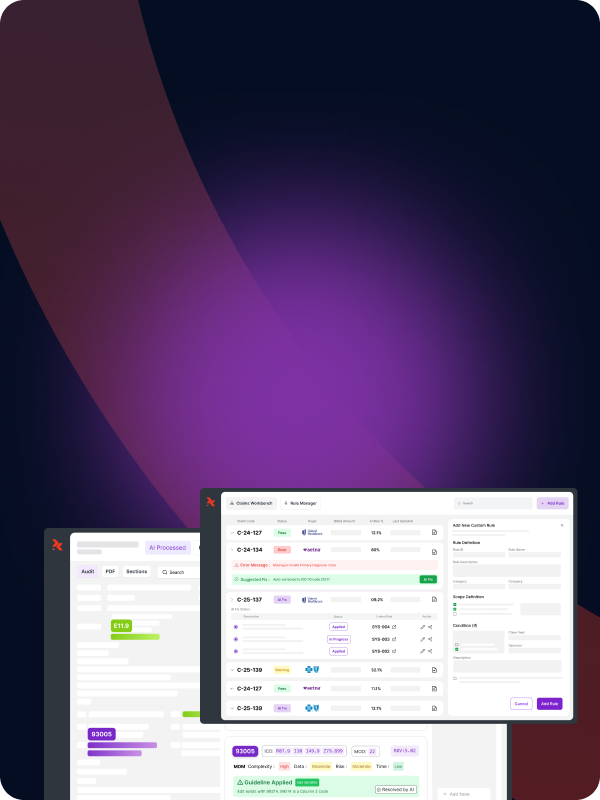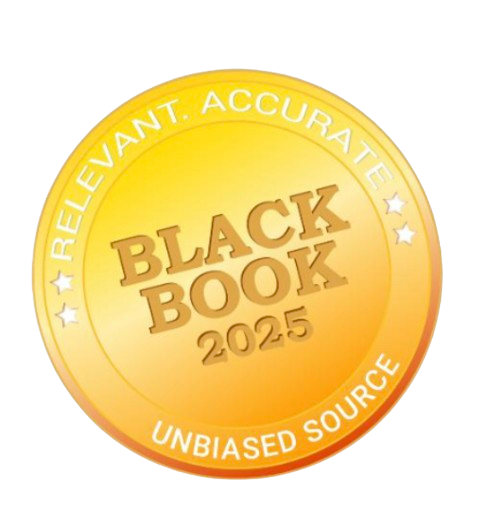.webp)
The Evolution of Medical Coding: Embracing Artificial Intelligence in Healthcare

Introduction
In the rapidly evolving landscape of healthcare, artificial intelligence (AI) is no longer just a buzzword—it’s a transformative force reshaping how medical professionals approach coding and documentation. As AI technologies mature, they are bringing about significant changes in medical coding, a field once dominated by manual processes and human expertise. This blog explores the intersection of AI and medical coding, focusing on how AI-driven solutions like those offered by RapidClaims are revolutionizing the industry.
The Rise of Artificial Intelligence in Medical Coding
Artificial intelligence aims to replicate human cognitive processes, and in the realm of medical coding, it has shown immense potential to streamline operations, enhance accuracy, and reduce costs. AI-driven coding solutions can analyze clinical documentation, extract relevant data, and apply appropriate medical codes with minimal human intervention. This capability is particularly valuable in an industry where accuracy is paramount, and errors can lead to significant financial and legal consequences.
AI’s Role in Process Improvement
One of the most significant benefits of integrating AI into medical coding is the potential for process improvement. Traditional coding methods are time-consuming and prone to errors, particularly as the complexity of healthcare data continues to grow. AI-driven solutions like RapidClaims automate these processes, ensuring that coding is not only faster but also more accurate. This streamlining allows healthcare providers to focus on patient care, knowing that their coding processes are optimized for efficiency and compliance.
Enhancing Team Efficiency
By automating routine tasks, AI reduces the burden on medical coders, allowing them to focus on more complex cases that require human judgment. This not only improves the efficiency of the coding team but also reduces the need for additional staffing, ultimately lowering labor costs. AI’s ability to handle large volumes of coding tasks with precision means that healthcare organizations can scale their operations without compromising on quality or accuracy.
Cost Savings Through AI in Coding
Cost containment is a critical concern in healthcare, and AI offers a powerful solution. By minimizing coding errors, AI helps avoid costly claim denials and rework, leading to significant savings. Additionally, the reduction in manual coding tasks means that organizations can reduce their reliance on large coding teams, further cutting costs. RapidClaims, with its AI-driven approach, exemplifies how healthcare providers can achieve these savings while maintaining high standards of accuracy and compliance.
Accuracy Enhancement
In medical coding, accuracy is everything. Mistakes can lead to incorrect billing, potential audits, and legal complications. AI excels in this area by analyzing vast amounts of data with unparalleled precision, identifying patterns and inconsistencies that might be missed by human coders. The result is a higher accuracy rate, which translates into fewer denied claims and a smoother revenue cycle for healthcare providers.
Compliance Assurance
The healthcare industry is governed by strict regulations, and staying compliant with the latest coding standards is a constant challenge. AI helps by continuously updating its coding databases with the latest rules and guidelines, ensuring that all coding practices adhere to current standards. This not only reduces the risk of non-compliance but also instills confidence in healthcare providers that their coding processes are up-to-date and error-free.
The Future of Medical Coding: A Partnership Between AI and Human Coders
While AI is transforming the medical coding landscape, it’s important to recognize that it complements rather than replaces human coders. AI handles routine, repetitive tasks, freeing coders to engage in more complex problem-solving and critical thinking. As the role of coders evolves, there is a growing emphasis on soft skills such as adaptability, attention to detail, and critical thinking—skills that AI cannot replicate.
Adaptability in a Changing Landscape
As AI continues to advance, medical coders must be adaptable, ready to embrace new technologies and workflows. The ability to adjust to these changes is crucial for success in a field that is rapidly evolving. Coders who are willing to learn and grow alongside AI will find themselves better equipped to handle the challenges of the future.
Attention to Detail
AI can automate many aspects of coding, but it still relies on accurate input data to function effectively. Coders must maintain a high level of attention to detail to ensure that the information being fed into AI systems is correct and comprehensive. This meticulousness is essential for the accurate coding of patient health records and the overall success of the coding process.
Critical Thinking
AI is a powerful tool, but it has limitations, particularly when it comes to critical thinking and contextual understanding. Human coders bring these qualities to the table, using their expertise to make informed decisions that AI might not be capable of. By working in tandem with AI, coders can enhance the accuracy and efficiency of the coding process, ensuring that all documentation is handled with the highest level of care.
Conclusion
The integration of artificial intelligence into medical coding is not just a trend—it’s a necessary evolution in an increasingly complex healthcare environment. By embracing AI, healthcare providers can streamline their coding processes, reduce costs, and improve accuracy. However, the role of human coders remains vital, particularly in areas that require critical thinking and nuanced understanding. Companies like RapidClaims are leading the way in this AI-driven revolution, providing solutions that enhance the efficiency and effectiveness of medical coding while ensuring that human expertise continues to play a crucial role.
As we look to the future, it’s clear that the partnership between AI and human coders will be central to the success of healthcare organizations. By leveraging the strengths of both, we can create a coding process that is not only more efficient but also more accurate and compliant with the ever-changing landscape of healthcare regulations.
%201.png)









